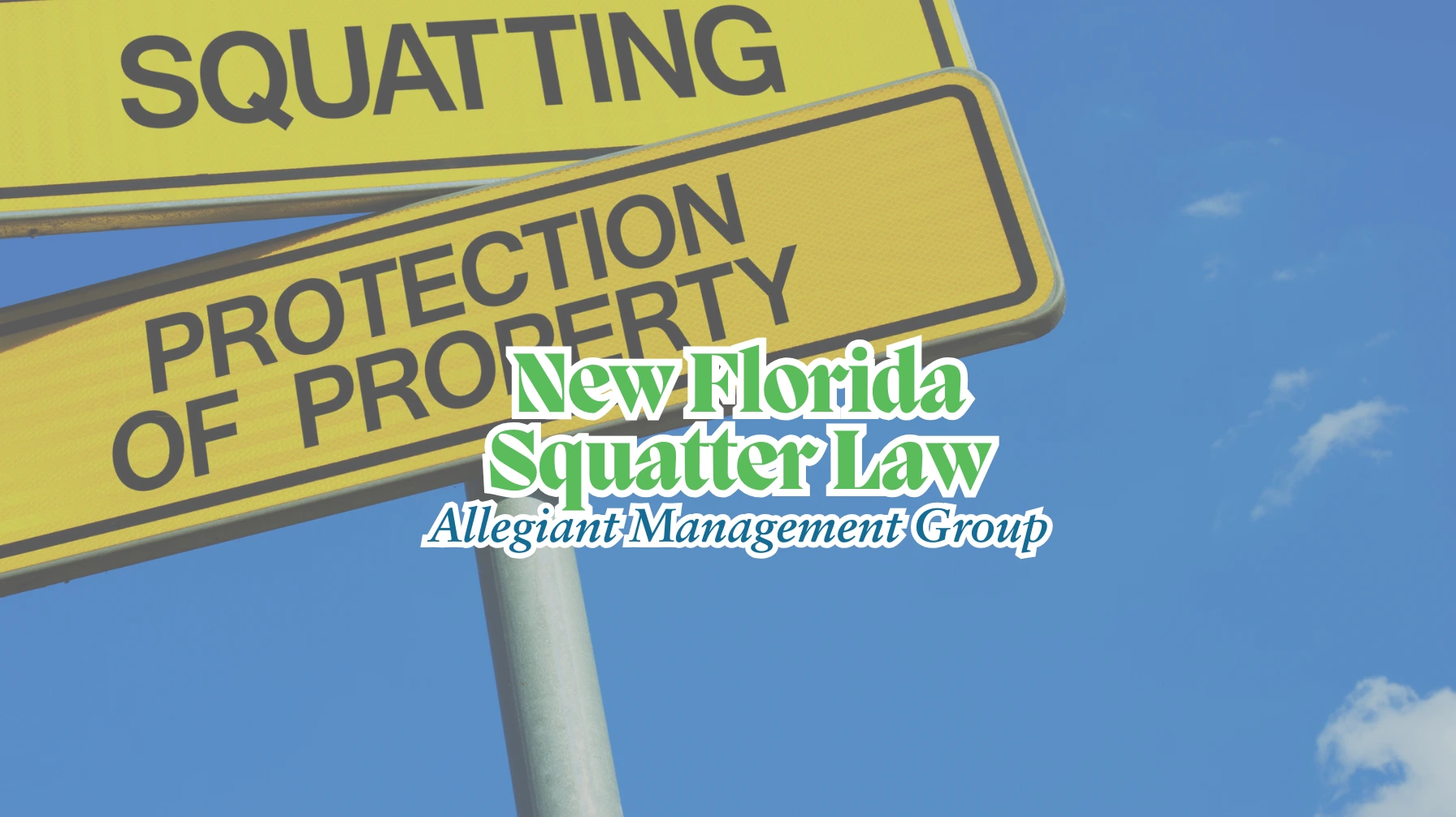Last Updated: October 31, 2025.
Florida's New Law on Squatters’ Rights Was a Fight for Private Property Rights
Florida property owners have long struggled with squatters—unauthorized people living in homes or real property without permission. Squatting can lead to lost rent, property damage, and legal headaches.
Before 2024, it was difficult to remove these unauthorized occupants because of unclear local laws. Police often said it was a “civil matter,” and owners had to go through long, frustrating court processes.
Lawmakers Change Florida Squatter Laws: Introducing the 2024 Squatters Bill (HB 621)

This shifted with the new anti-squatter law, known as Florida House Bill 621 in 2024. Florida Statute Chapter 83 of Florida’s landlord-tenant laws does not directly address this issue. However, the new law helps property owners regain control of their homes more easily through legal action.
We will cover the topic as a whole with a focus on:
- Florida squatters’ law and rights
- The eviction process in Florida
- Adverse possession in Florida and related legal claims
- How to remove a squatter who lacks legal title
Let’s examine this new legislation more closely and understand its significance for unoccupied property.
Florida Legislators Took a Stand with a New Florida Squatter Bill
To protect property owners, the Florida Legislature passed House Bill 621. This new law started on July 1, 2024. Often called the Florida squatters’ law, this legislation strengthens private property rights and sets a precedent for other states—effectively reshaping how squatting cases are handled.
During the 2024 Legislative Session, lawmakers passed HB 621. This law makes it quicker to remove people who live in a home without paying rent or owning it legally. It empowers law enforcement to act quickly for the true owner and helps clarify how to deal with squatters.
The bill, titled “Property Rights,” received bipartisan support—highlighting the seriousness of the problem for Florida property owners.
Importantly, this law does not apply if the occupant had legal permission to live there at some point.
Florida is taking the lead, but this issue is spreading across the U.S. More states will likely suggest similar laws in their 2025 sessions.
Thanks to HB 621, property owners now have clearer rules to protect their rights. They can act against illegal occupants and better understand how to legally remove unauthorized residents.
Define Squatter: What Is a Squatter in Florida?
A squatter is someone who lives in an empty or abandoned residential dwelling without the owner’s permission and refuses to leave. This is illegal because they have no legal right to be there.
It may appear to be simple trespassing, but it can be more complicated in Florida. You may need to follow a specific legal process to remove them.
However, in some cases, squatters can claim adverse possession over time. This legal rule allows someone to gain ownership if they live on the property long enough and pay property taxes.
If the person had permission to stay at some point, like a former tenant, different rules apply. Every legal dispute is fact-specific. Laws vary by state, but the concept of adverse possession stems from common law.
Florida Squatting Rights: Do Squatters Have Rights in FL?
Florida squatting rights are a hot topic. People often ask, “Why do squatters have rights?” Squatters’ rights come down to a legal concept called adverse possession.
Under Florida law, Chapter 95, Section 95.18, a person can potentially claim ownership of property even without legal title, subject to strict conditions.
To do this, the adverse possessor must meet certain requirements—such as living on the property openly and continuously—sometimes including paying taxes.
Other states, like Oregon, have similar laws based on adverse possession. We’ll explore how different states handle this later in the article.
Florida Squatting Laws: How to Claim Squatters’ Rights Through Adverse Possession (OCEAN)

To claim ownership through adverse possession in Florida, an occupant must meet strict legal requirements. Remember the acronym OCEAN:
- Open and Notorious Possession: Use of the property is obvious; the true owner could notice it upon inspection.
- Continuous Possession: The occupant lives on the property without interruption for a set number of years (commonly cited as 7 in Florida; timeframes differ in other states).
- Exclusive Possession: Only the occupant controls the property—sharing control can defeat the claim.
- Actual Possession: The occupant physically uses the land (residing, improving, cultivating); mere claims are insufficient.
- Hostile Possession: Occupancy is without the owner’s permission (not necessarily aggressive—just without consent).
Adverse possession is a narrow, technical pathway—not a shortcut. New legal processes in Florida have made unauthorized occupancy more difficult to maintain.
An Overview of Florida Squatters’ Rights & the New Squatter Law (HB 621)
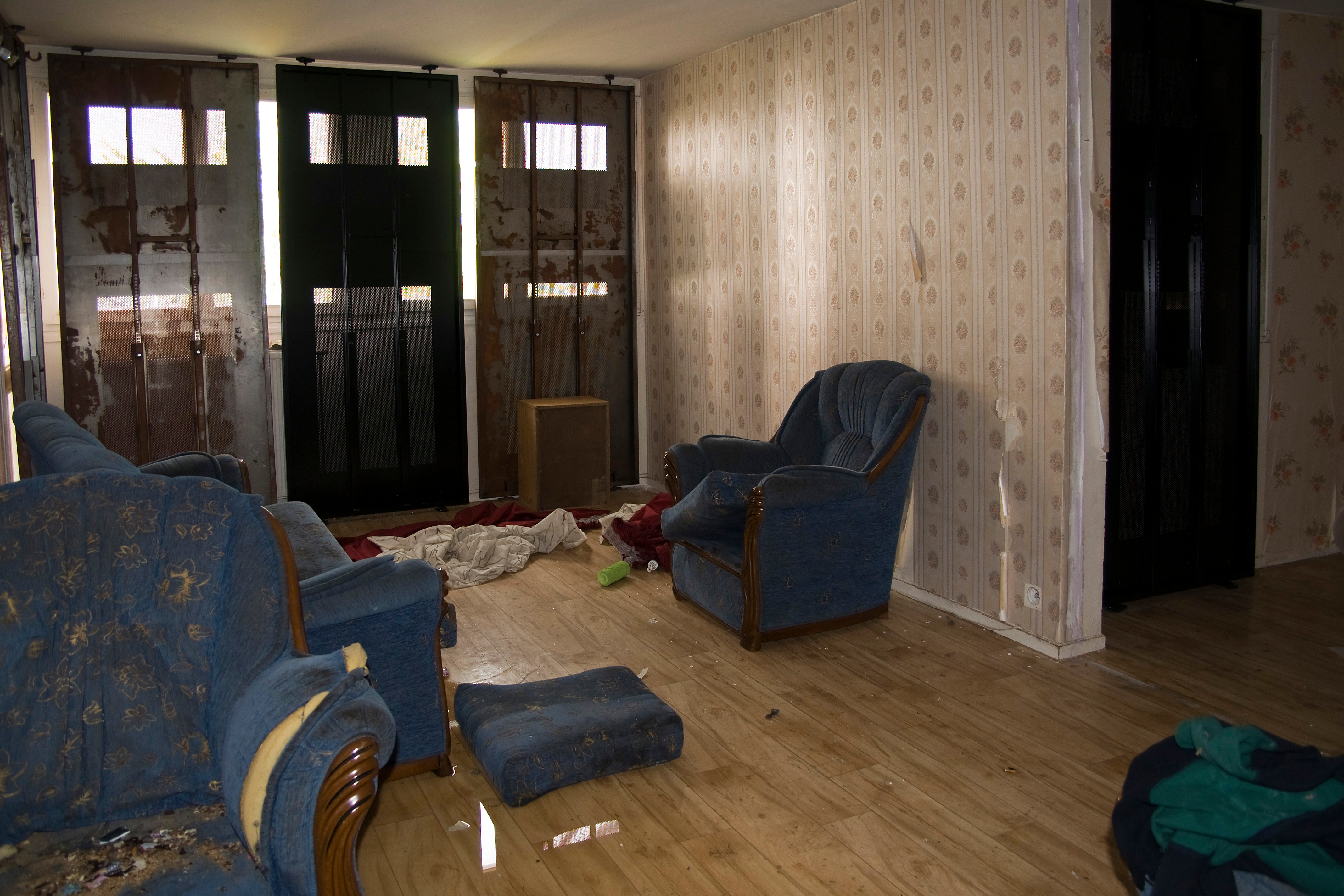
On March 27, 2024, Governor Ron DeSantis signed HB 621 the squatter bill into law. This law allows property owners and managers to more rapidly remove squatters who refuse to leave. It provides clearer steps for law enforcement when dealing with unauthorized occupants who lack legal documentation. Squatting cases can now carry criminal penalties.
Florida Squatters’ Rights & Rules — Key Highlights of HB 621
- Faster Removals: In qualifying cases, owners can seek removal when no lease or legal rights exist. Some notices may require squatters to leave within 24 hours.
- Protection from Property Damage: Owners can seek payment for repairs when damage occurs.
- Stricter Penalties: Fraudulent claims, organized activity, or repeat offenses may trigger felony charges.
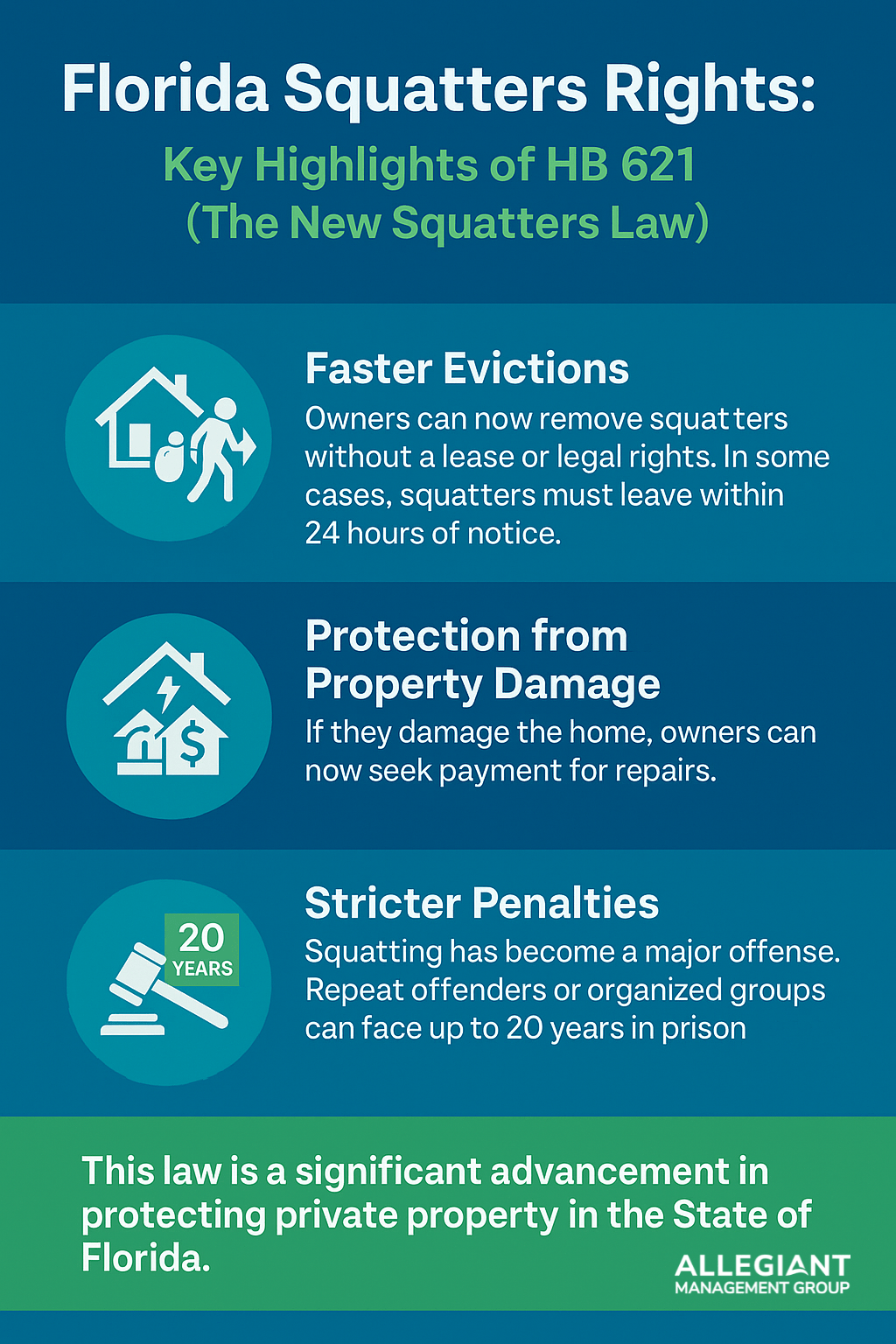
Preventing Squatters in Florida — Tips for Property Owners
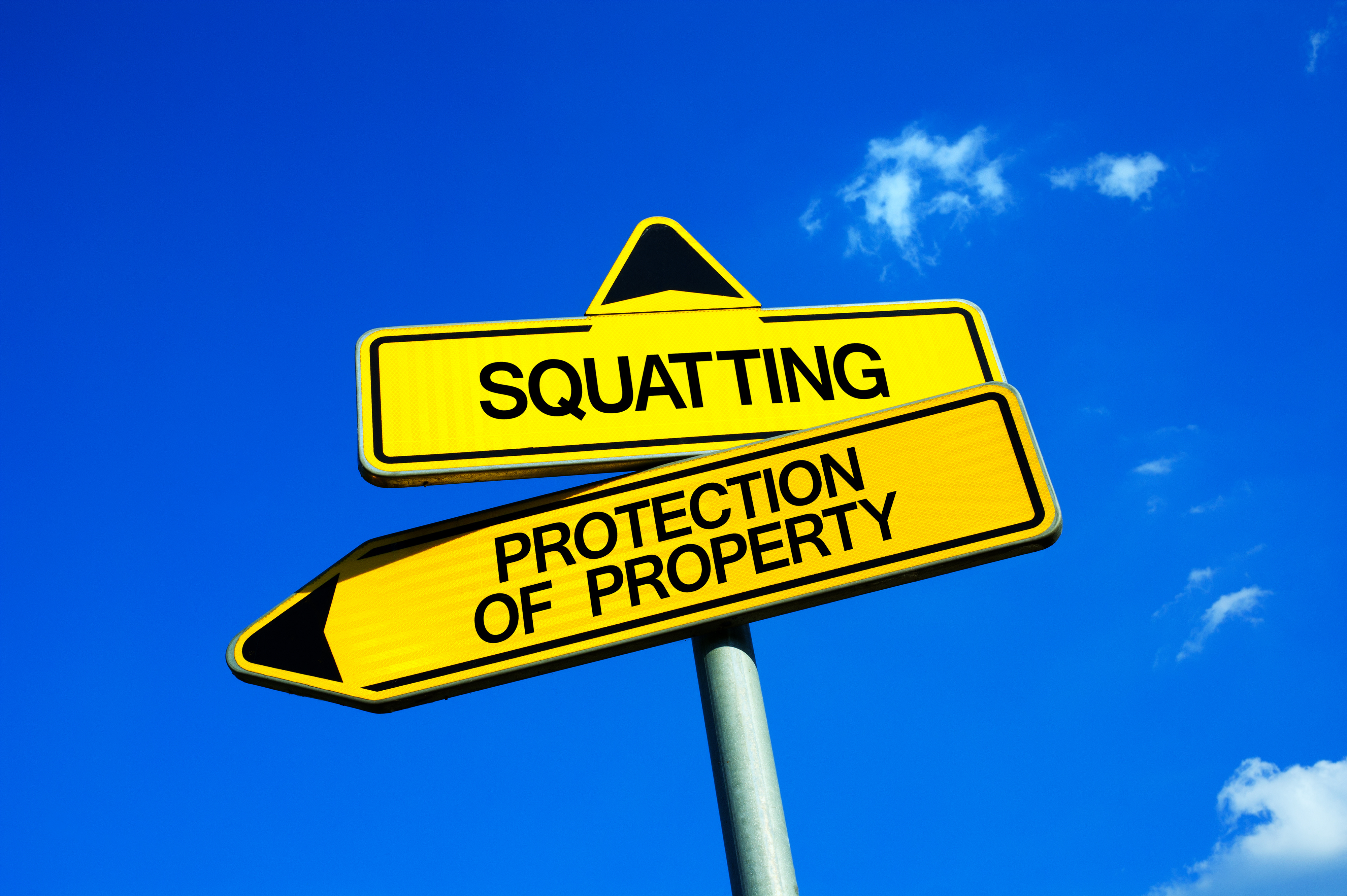
Here are tips for keeping squatters away from your property and avoiding a squatter removal scenario:
- Regular Visits: Inspect your property routinely to deter illegal occupation.
- Secure the Property: Lock all entry points and consider installing security cameras.
- Engage Neighbors/HOA: Ask neighbors or your HOA to report suspicious activity at vacant homes.
- Post “No Trespassing” Signs: These notices can support your position against adverse possession claims.
- Hire a Property Management Firm: Professional managers can monitor and protect your property through dedicated services.
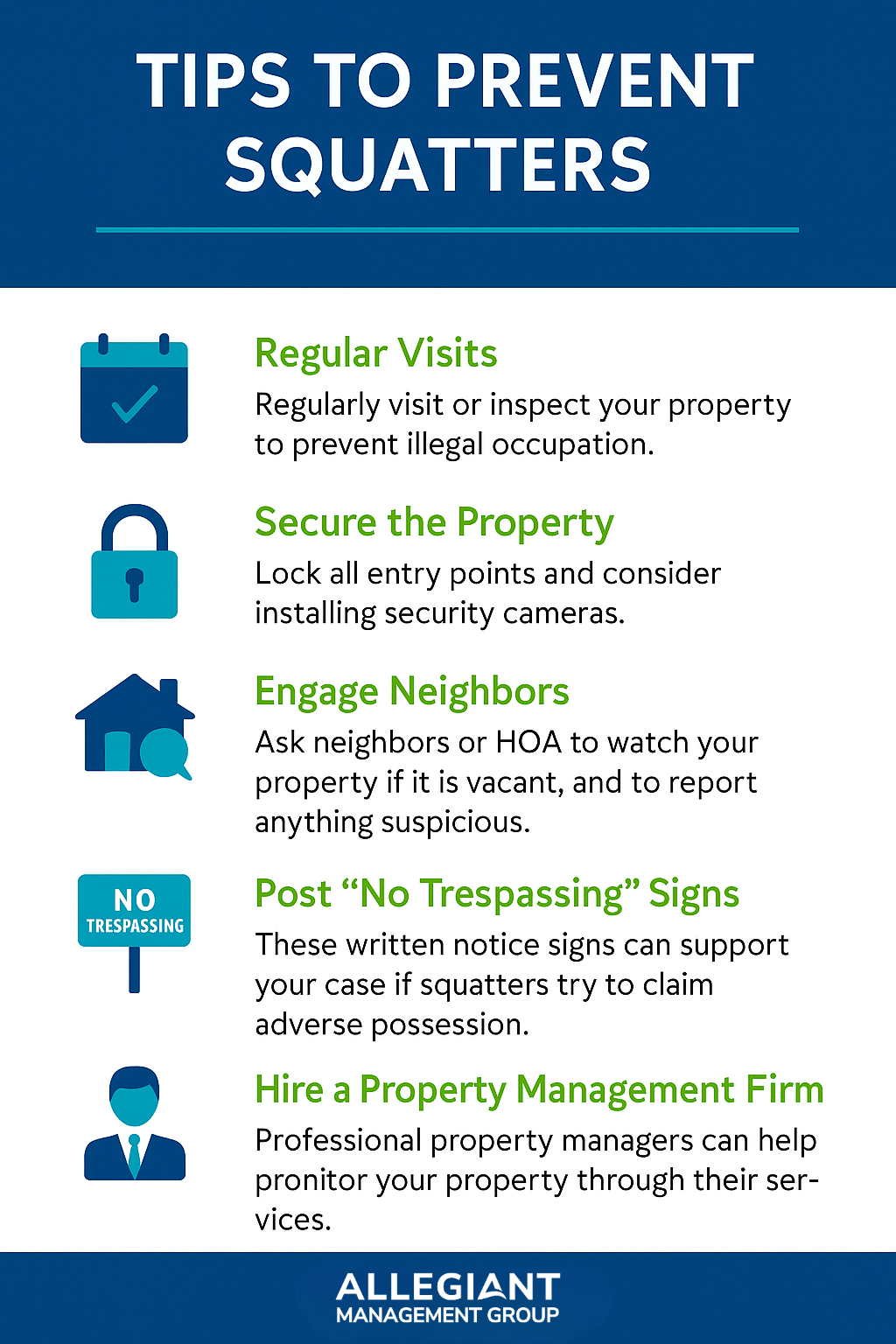
How Property Managers Can Help with Squatters
Allegiant Management Group specializes in professional property management across Central Florida—and we have real-world experience handling squatter-related issues quickly and legally.
If someone is occupying your rental property without permission, time is critical. Removals can take longer if not handled correctly. That’s where our team steps in.
Here’s how we support property owners facing squatters:
- Legal Support: We coordinate with attorneys to initiate action and remove unauthorized occupants swiftly and lawfully.
- Routine Property Inspections: Proactive inspections catch issues early.
- Thorough Tenant Screening: We conduct detailed background checks to reduce lease violations.
- Vacant Property Monitoring: Our Vacant Home Watch service regularly checks unoccupied homes.
“This law was a necessary step forward in protecting private property rights. For too long, owners were left powerless against unlawful occupancy. Now, they have a clear and enforceable path to reclaim what’s rightfully theirs.”— Maria Napolitano, Broker & Co-Founder, Allegiant Management Group
Florida SB 322 — Strengthening Property Rights
As of July 1, 2024, new laws make it easier to remove unlawful occupants. In 2025, Florida lawmakers introduced Senate Bill 322 (SB 322) to further strengthen private property rights.
- Property owners can pursue legal action faster when someone occupies a property without consent.
- Unauthorized persons do not gain legal rights simply by occupying a property.
- Supports enforcement of trespass laws, distinguishing legitimate tenants from unlawful occupants.
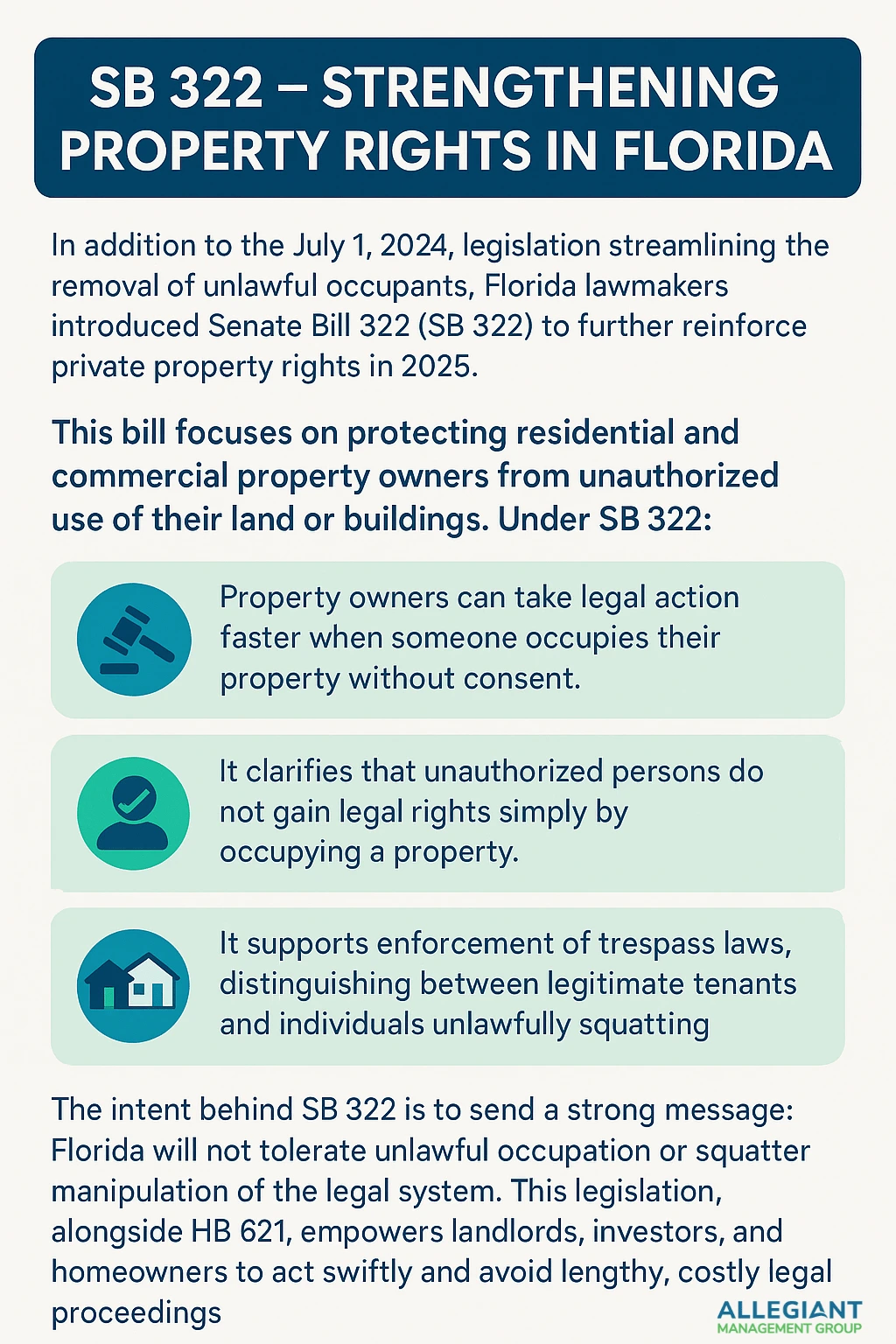
New U.S. Squatter Laws in 2025
In 2025, several U.S. states updated squatter laws to protect property owners and streamline the removal of unauthorized occupants.
Florida, Texas, Georgia, New York (New York City), and West Virginia enacted measures limiting squatter claims and clarifying that squatters are not legal tenants. Some states shortened timelines or expanded sheriff authority, while others increased penalties for fraudulent lease claims.
Your Property. Your Rights. Protected.
Contact Allegiant Management Group to learn how we help landlords address squatter issues and stay informed on Florida’s rental market.
- Protect your property
- Partner with experienced professionals
- Let us take the worry off your plate
How to Evict/Remove a Squatter in Florida (Step-by-Step)
- Contact your local sheriff’s office and request the squatter affidavit form.
- Complete and notarize the affidavit, confirming the individual is unlawfully occupying your property.
- Submit the affidavit and valid ID to the sheriff.
- The sheriff posts a 24-hour notice to vacate.
- If the squatter refuses, law enforcement may remove them pursuant to the statute.
This process typically applies to residential properties only and does not apply to landlord-tenant disputes.
Penalties for Squatters in Florida
Unlawful occupancy can trigger criminal consequences:
- Second-degree misdemeanor: Refusing to leave after a sheriff’s notice (in qualifying circumstances)
- Felony charges: For fraud (fake leases), criminal mischief/property damage, or organized activity
- Restitution: Courts may order damages payable to the property owner
Download the Florida Squatter Removal Affidavit (PDF)
Many county sheriff offices provide downloadable versions of the affidavit required to initiate removal. Examples:
Tip: Always check your county’s official website or call their office directly—requirements may vary.
Squatting vs. Tenant Rights: What’s the Difference?
Here’s a quick comparison to help distinguish squatters from tenants:
| Squatter | Tenant |
|---|---|
| No lease or rental agreement | Signed lease or verifiable agreement |
| Entered property without permission | Granted access by owner/agent |
| May be subject to sheriff removal via affidavit (if statute applies) | Removal requires formal eviction process |
Watch Our Video: The New Law on Squatters in Florida — Overview
Frequently Asked Questions (FAQs)
What is squatting?
Squatting means living in a building or on land without legal permission—often in an empty or abandoned property.
What are squatters’ rights?
Squatters’ rights refer to adverse possession—where a person may gain legal ownership after meeting strict requirements (e.g., open, exclusive, continuous use over time). In Florida, a commonly cited period is 7 years, often with tax payment requirements.
What is the new law in Florida about squatters?
Florida passed a law in 2024 enabling faster removal of certain unauthorized occupants through a sheriff-facilitated process, in qualifying scenarios without a court order. This is distinct from traditional landlord-tenant evictions.
Can a squatter adverse possession in Florida?
In Florida, a squatter may claim ownership under adverse possession if they live on a property without permission, openly and continuously, for at least seven years — and satisfy other requirements like paying taxes. But the process is difficult and time-consuming; it is neither automatic nor common.
Where is squatting legal?
In the U.S., every state has adverse-possession laws that allow someone who occupies property they don’t own to eventually claim it — but only if they meet strict conditions (time, tax payments, open possession, etc.). That doesn’t mean ‘squatting is legal’ — it means there’s a narrow path that may lead to ownership if ignored.
Why do squatters have rights?
Adverse possession laws encourage productive land use, discourage neglect, and provide a legal framework to resolve long-term occupancy disputes.
Can you turn off electricity on squatters?
No. Cutting utilities to force someone out is an illegal “self-help” action. Use lawful processes.
How can you remove a squatter?
Options include the sheriff affidavit process (if applicable) or an unlawful detainer action through the courts—culminating in a writ of possession executed by law enforcement.
How to claim squatters’ rights in Florida?
Maintain open, continuous, exclusive possession for the statutory period, pay taxes where required, and file appropriate forms with the county property appraiser—subject to the statute’s conditions.
How to evict a squatter in Florida?
File an unlawful detainer action in county court, serve the occupant, obtain a judgment, and have law enforcement execute the writ of possession.
What is Florida House Bill 322?
SB/House initiatives in 2025 seek to bolster private property rights, expedite lawful removals, and deter organized trespass—verify current text and status before citing specifics.
Disclaimer: This article is for information only and is not legal advice. Consult an attorney for guidance on your specific situation.


